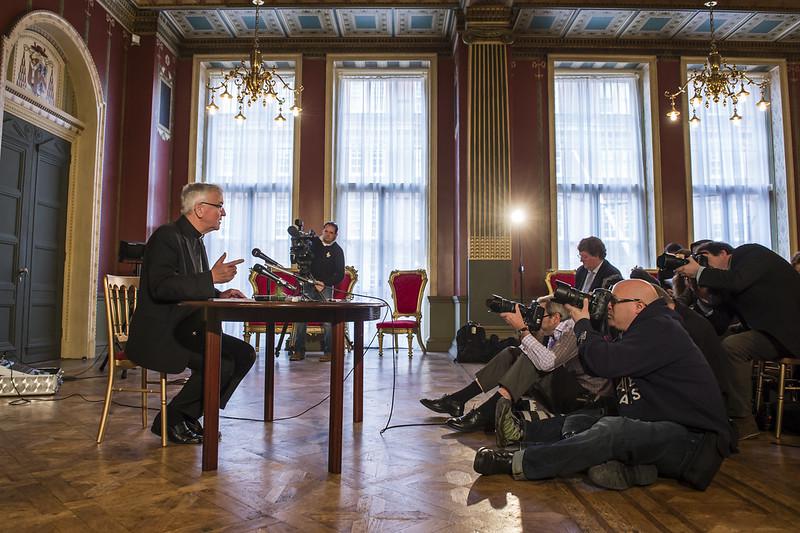|
Catholic bishops pledge changes to safeguarding
By Catherine Pepinster
Catholic bishops of England and Wales have admitted that their safeguarding work must change and have outlined how this will happen. Their admission comes just days after a damning report from the Independent Inquiry into Child Sexual Abuse which lambasted its safeguarding structures and poor treatment of survivors and singled out Archbishop of Westminster Cardinal Vincent Nichols for criticism. At a press conference today, when the bishops unveiled their new safeguarding set-up, Cardinal Nichols said he had no intention of quitting. Survivors had called for his immediate departure following the IICSA report but the cardinal said he would be staying put while the Church reorganises its safeguarding. “I have no wish to turn my back on this challenge and walk away,” he said. Cardinal Nichols, the Archbishop of Westminster, together with Malcolm McMahon, Archbishop of Liverpool, Marcus Stock, Bishop of Leeds and vice-chair of the National Catholic Safeguarding Commission, and Paul Mason, bishop for safeguarding, unveiled the review of the Church’s safeguarding structures and arrangements, undertaken by child protection specialist Ian Elliott. The new system would finally go some way to fulfilling the pledge to create a One Church approach to safeguarding – 19 years after it was first recommended by Lord Nolan in his report on the Catholic Church and child protection. The review recommends disbandment of the two current main bodies for safeguarding, the National Catholic Safeguarding Commission (NCSC) and the Catholic Safeguarding Advisory Service (CSAS). They would be replaced by one institution, the Catholic Safeguarding Agency, which would be a regulatory body determining policy on safeguarding for all dioceses in England and Wales to follow. There would be a special body for safeguarding for religious orders with its own staff after the review said that the current system of orders aligning with dioceses has failed. There would also be a new National Tribunal Service to deal with cases under canon law. According to the summary of the Elliott Review, those consulted “formed the belief that the current safeguarding structure at the national level was not delivering as was hoped and that it should be set aside and replaced by a revised unitary structure”. The national policy framework had not worked, said the Review, because CSAS had no power or authority to insist its advice and guidance was followed. Instead the Review recommends “a structure that was underpinned by a commitment to a Church-wide adoption of a set of safeguarding standards” that would be “empowered to undertake its role as a regulator” and would monitor compliance of the dioceses and other church bodies. Ian Elliott told the press conference: “The report argues for structural change and the new body will sit at the centre of the Church.” The plan for the regulatory body enforcing compliance depends on a contractual set up, Mr Elliott explained, which was necessary in the absence of a recognitio being provided by Rome, which would enable a general law for the Church in England and Wales to enforce the same safeguarding regime across all dioceses. The detail of this recognitio was first discussed by the bishops in 2010 yet was only sent to Rome last year. A year on, it has still not been granted. The press conference was held following a plenary meeting of the bishops when they spent a day discussing the IICSA findings and the Elliott Review. In a statement read to the press conference by Archbishop McMahon, the bishops said they accepted the recommendations for change of the IICSA report and that its findings were “shocking and overwhelming”. They expressed their sorrow and committed themselves to “listen more intently” to those who had been abused. Cardinal Nichols read out his own personal statement, saying that he was “shocked and ashamed” by the IICSA report and, with his voice shaking, said: “A dark cloud hangs over my heart.” “I am very sorry”, he said. “I will continue listening”. While he had received letters of anger and disgust since publication of the report, he said, he had also received “letters of respect and esteem for my continuing ministry”. Archbishop McMahon, vice-president of the Catholic Bishops Conference of England and Wales, said that the Cardinal Nichols was elected its president some years ago and that at their plenary this week the bishops backed him. “We said how much we support him. He has our fullest confidence”, said Archbishop McMahon. Among the criticisms made by IICSA was the time it has taken the Catholic Church to get things done and in their statement the bishops said “the work of implementation” of the Elliott Review would begin immediately. Bishop Stock said: “Much of the critcism of IICSA is the slow speed of change and the bishops have recognised this.” However, there is no clear timeline yet for the new safeguarding set-up. Both the NCSC and the CSAS will have to be disbanded. “There is no presumption that their existing membership will have a part to play” in the new Catholic Safeguarding Standards Agency, said Bishop Stock. An implementation committee will have to be set up to organize the new organizations and structures and professional advisers will have to be recruited to help with this. Survivors will need to be consulted, said Bishop Stock. Last week, the IICSA report said that “It would be wrong, however, to regard child sexual abuse within the Roman Catholic Church as solely a historical problem. Since 2016, there have been more than 100 reported allegations each year.” But Bishop Mason told the press conference that: “Going to a Catholic Church is one of the safest places you can find”.
|
.
Any original material on these pages is copyright © BishopAccountability.org 2004. Reproduce freely with attribution.
